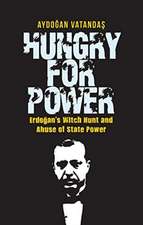The Iron Cage of Liberalism: International Politics and Unarmed Revolutions in the Middle East and North Africa
Autor Daniel Ritteren Limba Engleză Hardback – 18 dec 2014
Preț: 628.85 lei
Preț vechi: 901.66 lei
-30% Nou
Puncte Express: 943
Preț estimativ în valută:
120.33€ • 125.63$ • 99.59£
120.33€ • 125.63$ • 99.59£
Carte tipărită la comandă
Livrare economică 25-31 martie
Preluare comenzi: 021 569.72.76
Specificații
ISBN-13: 9780199658329
ISBN-10: 0199658323
Pagini: 288
Dimensiuni: 162 x 240 x 22 mm
Greutate: 0.59 kg
Editura: Oxford University Press
Colecția OUP Oxford
Locul publicării:Oxford, United Kingdom
ISBN-10: 0199658323
Pagini: 288
Dimensiuni: 162 x 240 x 22 mm
Greutate: 0.59 kg
Editura: Oxford University Press
Colecția OUP Oxford
Locul publicării:Oxford, United Kingdom
Recenzii
Within this matrix of scholarly endeavour, Daniel Ritter's book The Iron Cage of Liberalism is an innovative contribution ... Unlike most studies in this area, Ritter has oriented his analysis to the phenomenon of unarmed revolution.
In a new, bold analysis, Daniel Ritter theorizes unarmed revolutions by studying foreign policy rather than looking at internal balances of power ... [He] examines three successful cases of unarmed revolutions, Iran in 1979 and Tunisia and Egypt in 2011, then goes on to contrast them with three failed cases, Iran in 2009, and Libya and Syria in the context of the Arab Spring.
He [Ritter] has put a new thesis on the crowded table of Middle Eastern commentary, which deserves attention.
In this timely and well written account of civil resistance in the Middle East and North Africa, Ritter sheds light on an important but largely overlooked factor: the international political relationships that make authoritarian regimes vulnerable to domestic unarmed revolutions. More than any other scholar, Ritter reveals how the interactive effects of structure, ideology, and strategic action shape the trajectory of nonviolent uprisings. This is essential reading for anyone interested in civil resistance and revolutions.
Ritter, one of the two or three most important young scholars of revolutions and related matters, has produced a fiercely intelligent, challenging, and engaging book that fundamentally shifts the ground many of us have been and more everyday seek to explore and explicate. A clever focus on liberalisms iron cage which limits regime responses and enables nonviolence and a salutary reminder that more than we think and perhaps more than ever before, international relations matter, are explored through rich assessments of Iran, Tunisia, and Egypt, with implications and ramifications teased out far and wide, in the context of a theoretically sophisticated framework which will loom large for years to come. This is a voice and perspective to be reckoned with.
In times of national and international conflicts around and about democracy, this rigorous comparative study helps us understand the dynamics and outcomes of civil society struggles and regimes reactions. Focusing on the ways in which international ties can support but also constrain authoritarian regimes, it proposes an innovative explanatory angle. A book scholars of social movements and revolution will learn a lot from.
This is the most important study of how international relations shape revolutions in many years. Focusing on nonviolent revolutions in the Middle East and North Africa, Ritter skillfully details how rulers responses to protest were constrained by their international ties. Everyone who wants to understand the fate of modern dictatorships and democratic movements will need to read this book.
While the strategic effectiveness of nonviolent collective action seems to be a shared article of faith for many scholars, the unpleasant truth is that at least as many nonviolent revolutions fail as succeed. How are we to explain this variation? Drawing on his detailed analysis of the revolutions in Iran, Tunisia, and Egypt, Daniel Ritter offers a highly original answer to this question based on what he sees as the unique vulnerability of autocratic regimes with strong ties to Western democracies. An altogether welcome addition to the literatures on revolution and nonviolence.
Meticulously researched and compellingly presented, Daniel Ritters The Iron Cage of Liberalism will be studied for a long time to come because it asks two very important questions: why have we witnessed an upsurge of unarmed revolutionary attempts, and what explains the success of some of them? Its lessons may prove surprisingly relevant to real world outcomes.
Ritter's book succinctly pulls historical threads together and gives welcome attention to important questions of global and local agency, including the influence of actors and ideas, in the changing Middle East.
The book presents a compelling argument regarding the emergence of non-violent revolutions. Overall, this is a comprehensive and wellwritten study. It will be of interest to area specialists as well as those in the fields of revolutions and civil resistance. There is also scope for future work to test and build on the ICL theory in other regions to determine its broader applicability.
An exemplar of the comparative historical-analysis method...an interesting, thought-provoking thesis, which contributes positively to a crucial debate about the role of foreign powers in the Arab uprisings.
A compelling argument regarding the emergence of non-violent revolutions.
A provocative contribution to the scholarly study of the international dimensions of unarmed revolutions and the breakdown of authoritarianism.
In a new, bold analysis, Daniel Ritter theorizes unarmed revolutions by studying foreign policy rather than looking at internal balances of power ... [He] examines three successful cases of unarmed revolutions, Iran in 1979 and Tunisia and Egypt in 2011, then goes on to contrast them with three failed cases, Iran in 2009, and Libya and Syria in the context of the Arab Spring.
He [Ritter] has put a new thesis on the crowded table of Middle Eastern commentary, which deserves attention.
In this timely and well written account of civil resistance in the Middle East and North Africa, Ritter sheds light on an important but largely overlooked factor: the international political relationships that make authoritarian regimes vulnerable to domestic unarmed revolutions. More than any other scholar, Ritter reveals how the interactive effects of structure, ideology, and strategic action shape the trajectory of nonviolent uprisings. This is essential reading for anyone interested in civil resistance and revolutions.
Ritter, one of the two or three most important young scholars of revolutions and related matters, has produced a fiercely intelligent, challenging, and engaging book that fundamentally shifts the ground many of us have been and more everyday seek to explore and explicate. A clever focus on liberalisms iron cage which limits regime responses and enables nonviolence and a salutary reminder that more than we think and perhaps more than ever before, international relations matter, are explored through rich assessments of Iran, Tunisia, and Egypt, with implications and ramifications teased out far and wide, in the context of a theoretically sophisticated framework which will loom large for years to come. This is a voice and perspective to be reckoned with.
In times of national and international conflicts around and about democracy, this rigorous comparative study helps us understand the dynamics and outcomes of civil society struggles and regimes reactions. Focusing on the ways in which international ties can support but also constrain authoritarian regimes, it proposes an innovative explanatory angle. A book scholars of social movements and revolution will learn a lot from.
This is the most important study of how international relations shape revolutions in many years. Focusing on nonviolent revolutions in the Middle East and North Africa, Ritter skillfully details how rulers responses to protest were constrained by their international ties. Everyone who wants to understand the fate of modern dictatorships and democratic movements will need to read this book.
While the strategic effectiveness of nonviolent collective action seems to be a shared article of faith for many scholars, the unpleasant truth is that at least as many nonviolent revolutions fail as succeed. How are we to explain this variation? Drawing on his detailed analysis of the revolutions in Iran, Tunisia, and Egypt, Daniel Ritter offers a highly original answer to this question based on what he sees as the unique vulnerability of autocratic regimes with strong ties to Western democracies. An altogether welcome addition to the literatures on revolution and nonviolence.
Meticulously researched and compellingly presented, Daniel Ritters The Iron Cage of Liberalism will be studied for a long time to come because it asks two very important questions: why have we witnessed an upsurge of unarmed revolutionary attempts, and what explains the success of some of them? Its lessons may prove surprisingly relevant to real world outcomes.
Ritter's book succinctly pulls historical threads together and gives welcome attention to important questions of global and local agency, including the influence of actors and ideas, in the changing Middle East.
The book presents a compelling argument regarding the emergence of non-violent revolutions. Overall, this is a comprehensive and wellwritten study. It will be of interest to area specialists as well as those in the fields of revolutions and civil resistance. There is also scope for future work to test and build on the ICL theory in other regions to determine its broader applicability.
An exemplar of the comparative historical-analysis method...an interesting, thought-provoking thesis, which contributes positively to a crucial debate about the role of foreign powers in the Arab uprisings.
A compelling argument regarding the emergence of non-violent revolutions.
A provocative contribution to the scholarly study of the international dimensions of unarmed revolutions and the breakdown of authoritarianism.
Notă biografică
Daniel Ritter is Assistant Professor of Sociology at Stockholm University. His primary research interests are revolutions, social movements, and international relations











